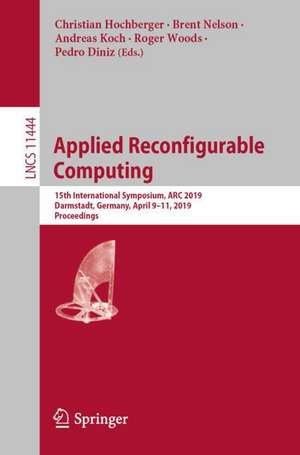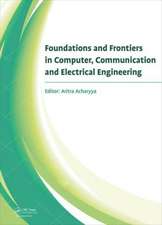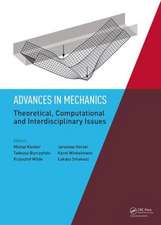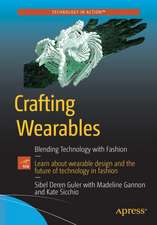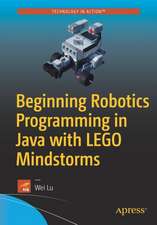Applied Reconfigurable Computing: 15th International Symposium, ARC 2019, Darmstadt, Germany, April 9–11, 2019, Proceedings: Lecture Notes in Computer Science, cartea 11444
Editat de Christian Hochberger, Brent Nelson, Andreas Koch, Roger Woods, Pedro Dinizen Limba Engleză Paperback – 29 mar 2019
The 20 full papers and 7 short papers presented in this volume were carefully reviewed and selected from 52 submissions. In addition, the volume contains 1 invited paper. The papers were organized in topical sections named: Applications; partial reconfiguration and security; image/video processing; high-level synthesis; CGRAs and vector processing; architectures; design frameworks and methodology; convolutional neural networks.
Din seria Lecture Notes in Computer Science
- 20%
 Preț: 1061.55 lei
Preț: 1061.55 lei - 20%
 Preț: 307.71 lei
Preț: 307.71 lei - 20%
 Preț: 438.69 lei
Preț: 438.69 lei - 20%
 Preț: 579.30 lei
Preț: 579.30 lei -
 Preț: 410.88 lei
Preț: 410.88 lei - 17%
 Preț: 427.22 lei
Preț: 427.22 lei - 20%
 Preț: 596.46 lei
Preț: 596.46 lei - 15%
 Preț: 448.04 lei
Preț: 448.04 lei - 20%
 Preț: 353.50 lei
Preț: 353.50 lei -
 Preț: 389.49 lei
Preț: 389.49 lei - 20%
 Preț: 309.90 lei
Preț: 309.90 lei - 20%
 Preț: 645.28 lei
Preț: 645.28 lei - 20%
 Preț: 763.23 lei
Preț: 763.23 lei - 15%
 Preț: 580.46 lei
Preț: 580.46 lei - 20%
 Preț: 310.28 lei
Preț: 310.28 lei - 20%
 Preț: 655.02 lei
Preț: 655.02 lei - 20%
 Preț: 1183.14 lei
Preț: 1183.14 lei - 20%
 Preț: 340.32 lei
Preț: 340.32 lei -
 Preț: 449.57 lei
Preț: 449.57 lei - 20%
 Preț: 591.51 lei
Preț: 591.51 lei - 18%
 Preț: 938.83 lei
Preț: 938.83 lei - 20%
 Preț: 337.00 lei
Preț: 337.00 lei - 20%
 Preț: 649.50 lei
Preț: 649.50 lei - 20%
 Preț: 607.40 lei
Preț: 607.40 lei - 20%
 Preț: 1414.79 lei
Preț: 1414.79 lei - 20%
 Preț: 1024.44 lei
Preț: 1024.44 lei - 20%
 Preț: 583.40 lei
Preț: 583.40 lei - 20%
 Preț: 453.32 lei
Preț: 453.32 lei - 20%
 Preț: 575.49 lei
Preț: 575.49 lei - 20%
 Preț: 1075.26 lei
Preț: 1075.26 lei - 20%
 Preț: 585.88 lei
Preț: 585.88 lei - 20%
 Preț: 825.93 lei
Preț: 825.93 lei - 17%
 Preț: 360.20 lei
Preț: 360.20 lei - 20%
 Preț: 763.23 lei
Preț: 763.23 lei - 20%
 Preț: 340.32 lei
Preț: 340.32 lei - 20%
 Preț: 504.58 lei
Preț: 504.58 lei - 20%
 Preț: 369.13 lei
Preț: 369.13 lei - 20%
 Preț: 580.93 lei
Preț: 580.93 lei - 20%
 Preț: 343.62 lei
Preț: 343.62 lei - 20%
 Preț: 350.21 lei
Preț: 350.21 lei - 20%
 Preț: 583.40 lei
Preț: 583.40 lei - 20%
 Preț: 583.40 lei
Preț: 583.40 lei - 15%
 Preț: 438.59 lei
Preț: 438.59 lei - 20%
 Preț: 341.95 lei
Preț: 341.95 lei - 20%
 Preț: 238.01 lei
Preț: 238.01 lei - 20%
 Preț: 538.30 lei
Preț: 538.30 lei
Preț: 339.14 lei
Preț vechi: 423.93 lei
-20% Nou
Puncte Express: 509
Preț estimativ în valută:
64.90€ • 67.51$ • 53.58£
64.90€ • 67.51$ • 53.58£
Carte tipărită la comandă
Livrare economică 14-28 aprilie
Preluare comenzi: 021 569.72.76
Specificații
ISBN-13: 9783030172268
ISBN-10: 3030172260
Pagini: 750
Ilustrații: XIII, 418 p. 217 illus., 110 illus. in color.
Dimensiuni: 155 x 235 mm
Greutate: 0.6 kg
Ediția:1st ed. 2019
Editura: Springer International Publishing
Colecția Springer
Seriile Lecture Notes in Computer Science, Theoretical Computer Science and General Issues
Locul publicării:Cham, Switzerland
ISBN-10: 3030172260
Pagini: 750
Ilustrații: XIII, 418 p. 217 illus., 110 illus. in color.
Dimensiuni: 155 x 235 mm
Greutate: 0.6 kg
Ediția:1st ed. 2019
Editura: Springer International Publishing
Colecția Springer
Seriile Lecture Notes in Computer Science, Theoretical Computer Science and General Issues
Locul publicării:Cham, Switzerland
Cuprins
Applications.- Fault-Tolerant Architecture for On-Board Dual-Core Synthetic-Aperture Radar Imaging.- Optimizing CNN-based Hyperspectral Image Classification on FPGAs.- Supporting Columnar In-Memory Formats on FPGA: The Hardware Design of Fletcher for Apache Arrow.- A Novel Encoder for TDCs.- A Resource Reduced Application-Specific FPGA Switch.- Software-Defined FPGA Accelerator Design for Mobile Deep Learning Applications.- Partial Reconfiguration and Security.- Probabilistic Performance Modelling when using Partial Reconfiguration to Accelerate Streaming Applications with Non-Deterministic Task Scheduling.- Leveraging the Partial Reconfiguration Capability of FPGAs for Processor-Based Fail-Operational Systems.- (ReCo)Fuse Your PRC or Lose Security: Finally Reliable Reconfiguration-based Countermeasures on FPGAs.- Proof-Carrying Hardware versus the Stealthy Malicious LUT Hardware Trojan.- Secure Local Configuration of Intellectual Property Without a Trusted Third Party.- Image/Video Processing.- HiFlipVX: an Open Source High-Level Synthesis FPGA Library for Image Processing.- Real-time FPGA implementation of connected component labelling for a 4K video stream.- A Scalable FPGA-based Architecture for Depth Estimation in SLAM.- High-Level Synthesis.- Evaluating LULESH Kernels on OpenCL FPGA.- The TaPaSCo Open-Source Toolflow for the Automated Composition of Task-Based Parallel Reconfigurable Computing Systems.- Graph-based Code Restructuring Targeting HLS for FPGAs.- CGRAs and Vector Processing.- UltraSynth: Integration of a CGRA into a Control Engineering Environment.- Exploiting reconfigurable vector processing for energy-efficient computation in 3D-stacked memories.- Automatic Toolflow for VCGRA Generation to Enable CGRA Evaluation for Arithmetic Algorithms.- Architectures.- ReM: a Reconfigurable Multipotent Cell for New Distributed Reconfigurable Architectures.- Update or Invalidate: Influence of Coherence Protocols on Configurable HW Accelerators.- Design Frameworks and Methodology.- Hybrid Prototyping for Manycore Design and Validation.- Evaluation of FPGA Partitioning Schemes for Time and Space Sharing of Heterogeneous Tasks.- Invited Talk.- Third Party CAD Tools for FPGA Design | A Survey of the Current Landscape.- Convolutional Neural Networks.- Filter-wise Pruning Approach to FPGA Implementation of Fully Convolutional Network for Semantic Segmentation.- Exploring Data Size to Run Convolutional Neural Networks in Low Density FPGAs.- Faster Convolutional Neural Networks in Low Density FPGAs using Block Pruning.
